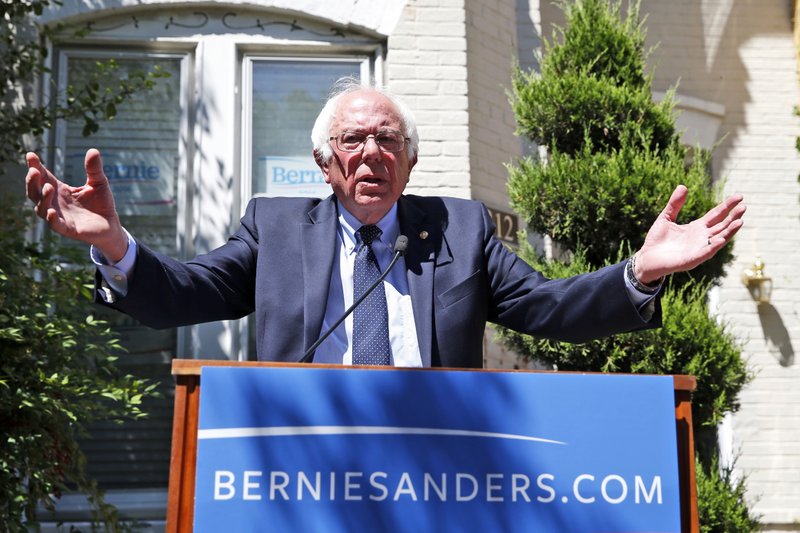BURLINGTON, Vt. -- Democratic presidential candidate Bernie Sanders said Thursday that he will work with Hillary Clinton to transform the Democratic Party, adding that his "political revolution" must continue and ensure the defeat of Republican Donald Trump.
FULL ELECTION COVERAGE
Sanders said in a online livestream address to his supporters that the major task they face is to "make certain" Trump is defeated. The U.S. senator from Vermont said he plans to begin his role in that process "in a very short period of time."
"But defeating Donald Trump cannot be our only goal. We must continue our grass-roots efforts to create the America that we know we can become," Sanders said, pointing to his 1,800 delegates lined up for the Democratic National Convention in Philadelphia.
Sanders, speaking from his Vermont hometown, did not concede the race for the party's presidential nomination; instead he offered a lengthy list of policy proposals he hopes to see approved by the party.
Sanders and Clinton met Tuesday night at a Washington hotel to discuss policy goals and plans. Sanders said that while it is "no secret" that he and Clinton have "strong disagreements on some very important issues," it was "also true that our views are quite close on others."
He said he looked forward to additional talks between the two campaigns to ensure that his supporters' voices are heard and the convention adopts "the most progressive platform" in the party's history.
Sanders said he looked forward to working with Clinton "to transform the Democratic Party so that it becomes a party of working people and young people, and not just wealthy campaign contributors."
The speech was viewed by more than 200,000 people, according to the campaign.
Looking ahead to the convention, Sanders said the party must support a $15-per-hour federal minimum wage, pay equity for women, a ban on the sale and distribution of assault weapons and a defeat of the Trans-Pacific Partnership trade deal.
Sanders thanked his supporters for providing more than $200 million in donations, most in average increments of $27, and rattled off what they had accomplished: 1.5 million people who attended his rallies and town meetings and more than 75 million phone calls from volunteers "urging their fellow citizens into action."
He encouraged his followers to consider running for political office up and down the ballot as a way to prevent Republicans from controlling state and city government.
"We have begun the long and arduous process of transforming America, a fight that will continue tomorrow, next week, next year and into the future," he said.
With the primary voting over, Clinton's campaign has continued expanding into general election territory, picking up an endorsement Thursday from the AFL-CIO, the nation's largest labor federation.
Trump swiftly accused labor leaders of selling out members to a candidate he said was aligned with Wall Street.
Clinton has won the endorsements of many of the AFL-CIO's largest unions in the past year, including the American Federation of State, County and Municipal Employees and the American Federation of Teachers, paving the way for the AFL-CIO to back her campaign. The labor federation represents 12.5 million members.
The AFL-CIO's general board voted to endorse Clinton.
"Hillary Clinton is a proven leader who shares our values," AFL-CIO President Richard Trumka said in a statement. "Throughout the campaign, she has demonstrated a strong commitment to the issues that matter to working people, and our members have taken notice."
A short time later, Trump said in a statement that the endorsement was a sign the union federation "no longer represents American workers."
For that reason, he predicted Thursday, the AFL-CIO's members would vote for him "in much larger numbers than" Clinton in November's general election.
Separately, House Speaker Paul Ryan said Thursday that he will continue to speak out in defense of conservative principles, despite a warning from Trump that Republican congressional leaders should "be quiet."
GOP leaders "have to get a lot tougher and be quiet. Just please be quiet, don't talk," the businessman said Wednesday.
Ryan, R-Wis., responded that he and other congressional leaders "represent a separate but equal branch of government" and vowed to "robustly defend the separation of powers."
Ryan said he was not bothered by Trump's comment or continued questions from the news media seeking his reaction to Trump.
"He's a different kind of candidate. This is a different kind of year," Ryan said.
But the New York businessman wasn't winning over every Republican.
Ohio Gov. John Kasich said he's still not ready to endorse Trump as the party's nominee.
Kasich says, "I'm not making any final decision yet but at this point I just can't do it."
Kasich, who was the last Republican to drop out of the presidential race, conceded in an interview on MSNBC's Morning Joe that he's feeling pressure in some circles for him to back the New Yorker.
He said there are people "who pound on me" but added that "I'm not prepared to do it." He said Trump is "going to have to change."
Information for this article was contributed by Jill Colvin, Lisa Lerer, Matthew Daly and staff members of The Associated Press.
A Section on 06/17/2016
